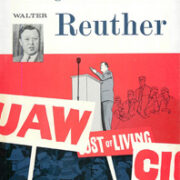Walter Reuther by Fred J. Cook
The epub format below is for your Apple and Android devices including Send-to-Kindle.
As you may know, Amazon has changed to the epub format to use with the Send-to-Kindle program. A great feature of the Send-to-Kindle program is that the file will go directly to your Library folder, and not have to be searched for in ES File Explorer or another app. If you use the mobi format in Send-to-Kindle, you will now get an error message. You can see instructions about Send to Kindle at https://www.amazon.com/gp/sendtokindle/email.
If you or your students want to download directly from this web site to an Amazon device, you can use the mobi format below. When you find the mobi file in ES File Explorer, it will then open in the Kindle app on your tablet. If you download an epub file to your Amazon tablet, it will also open if you have an app such as Overdrive on your tablet. The Kindle app offers an excellent reading experience to start with. Overdrive may need some customization of font size.
Download mobi file here.
When Walter Reuther spoke for labor, he spoke from a background of two generations in social reform and the labor movement, for his father and grandfather were leaders before him. As a boy, Walter grew up among the factories and mines of Wheeling, West Virginia. He became a diemaker and in 1927 went to Detroit, the Motor City. There the forces were beginning to work that were to create in the 1930’s the United Auto Workers and the Congress of Industrial Organizations. Walter became an excellent tool and die maker. He and his brother Victor educated themselves to become labor leaders, first in Detroit, and then on a round-the-world tour. They worked in the Union of Soviet Socialist Republics and saw firsthand how Communism repressed the workers. The brothers felt the weight of Nazism and Fascism in Germany and Italy.
Back in Detroit, Walter Reuther found the auto workers’ demand for a union increasing because of the effects of the Depression. Unemployment, wage cuts, and tighter and tighter control of the workers’ lives led to sit-down strikes, riots, bloodshed, martial law, and the ultimate capitulation of the Big Three, General Motors, Chrysler, and Ford, to the forces of the Union.
World. War II brought a new era of responsibility to labor leadership. Successively Reuther rose to head the UAW and the CIO. In the 1950’s, he helped merge the twin giants of the American labor movement, the older American Federation of Labor and the CIO. He worked to fight rising prices and for full employment.
Though assassins’ bullets twice endangered his life, he continued to work hard building the house of labor until his death in a plane crash in 1970.




Leave a Reply
Want to join the discussion?Feel free to contribute!